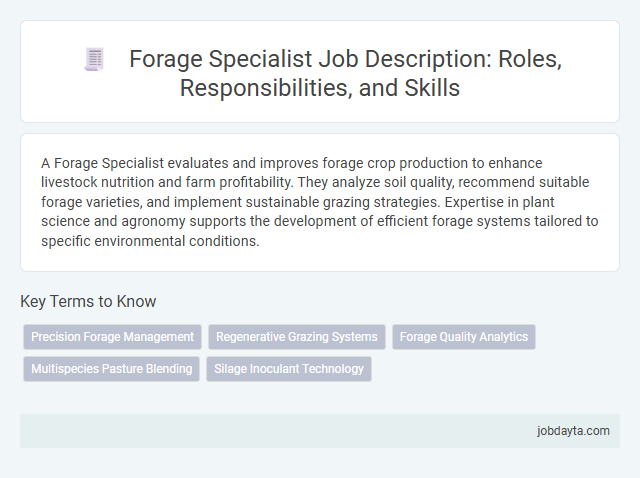A Forage Specialist evaluates and improves forage crop production to enhance livestock nutrition and farm profitability. They analyze soil quality, recommend suitable forage varieties, and implement sustainable grazing strategies. Expertise in plant science and agronomy supports the development of efficient forage systems tailored to specific environmental conditions.
Overview of a Forage Specialist Role
A Forage Specialist is an expert in the management and production of forage crops used for animal feed. This role involves developing strategies to improve forage yield, quality, and sustainability in agricultural systems.
- Forage Crop Management - Designs and implements plans for planting, maintaining, and harvesting forage crops to optimize feed resources.
- Soil and Plant Nutrition Analysis - Conducts soil tests and evaluates nutrient requirements to enhance forage growth and quality.
- Sustainable Agriculture Practices - Promotes environmentally friendly techniques that increase forage production while preserving soil health.
Key Responsibilities of a Forage Specialist
A Forage Specialist plays a critical role in optimizing forage production to enhance livestock nutrition and farm productivity. They analyze soil and plant samples to recommend best practices for forage growth and sustainability.
Key responsibilities include developing and implementing forage management plans tailored to specific farm conditions. They advise farmers on selecting appropriate forage species and varieties to maximize yield and quality. Monitoring pest and disease control measures ensures healthy forage stands throughout the growing season.
Essential Skills and Qualifications
Forage specialists play a crucial role in optimizing pasture management and improving livestock nutrition. Mastery of key skills enhances the productivity and sustainability of forage systems.
- Botanical Knowledge - Understanding plant species and their growth patterns is essential for effective forage selection and management.
- Soil Science Expertise - Proficiency in soil health assessment supports optimal nutrient management and forage yield.
- Analytical Skills - Ability to evaluate forage quality and adapt strategies based on environmental conditions improves farm outcomes.
Your expertise as a forage specialist directly contributes to sustainable agriculture and efficient livestock feeding practices.
Importance of Forage Management in Agriculture
Forage management plays a critical role in sustainable agriculture by ensuring the availability of high-quality feed for livestock. Proper techniques in harvesting, storage, and pasture rotation optimize nutrient intake and enhance animal productivity. Skilled forage specialists contribute to soil health, increase forage yield, and reduce production costs for farmers.
Daily Tasks and Job Duties
| Role | Forage Specialist |
|---|---|
| Primary Focus | Management and optimization of forage crops for livestock feed |
| Daily Tasks |
|
| Job Duties |
|
Educational Background and Certifications Required
A Forage Specialist plays a crucial role in optimizing forage crop production to support livestock nutrition and sustainable agriculture. Their expertise combines advanced education and relevant certifications to ensure effective forage management practices.
- Bachelor's Degree in Agriculture or Agronomy - This foundational education provides knowledge in plant science, soil health, and crop production essential for forage management.
- Certification in Crop Science or Forage Management - Professional certifications validate specialized skills in forage crop identification, pest control, and yield optimization.
- Continuing Education and Workshops - Ongoing training enhances knowledge of the latest forage technologies, pest resistance, and environmental regulations impacting forage production.
Challenges Faced by Forage Specialists
Forage specialists encounter challenges such as unpredictable weather patterns that affect crop yields and forage quality. Managing soil health while preventing pests and diseases requires precise knowledge and constant monitoring. Your ability to adapt to evolving environmental conditions is crucial for sustaining productive forage systems.
Impact of Forage Specialists on Livestock Productivity
How do Forage Specialists influence livestock productivity? Forage Specialists optimize pasture quality and nutrient management, directly enhancing animal health and growth rates. Their expertise ensures sustainable forage systems that maximize feed efficiency and support higher livestock yields.
Career Growth and Opportunities in Forage Specialization
Forage specialists play a crucial role in improving pasture management and livestock nutrition, driving advancements in sustainable agriculture. Expertise in forage crops such as alfalfa, clover, and ryegrass leads to increased productivity and environmental benefits.
Career growth in forage specialization offers opportunities in research, agribusiness, and extension services. Your knowledge in soil science, plant physiology, and crop management opens doors to leadership roles and innovative agricultural solutions.
How to Become a Successful Forage Specialist
Becoming a successful forage specialist requires a deep understanding of plant science, soil health, and livestock nutrition. Specialized education in agronomy or animal science provides the essential knowledge foundation.
Practical experience with forage crops, pasture management, and sustainable farming techniques enhances your expertise. Staying informed on the latest research and technologies in forage production boosts effectiveness in the field.
Related Important Terms
Precision Forage Management
Precision Forage Management enhances livestock productivity by using GPS-guided equipment, soil sensors, and satellite imagery to optimize forage growth and quality. Forage specialists analyze real-time data to tailor grazing patterns, fertilizer application, and harvest schedules, maximizing yield and nutrient efficiency while reducing environmental impact.
Regenerative Grazing Systems
Forage specialists play a critical role in advancing regenerative grazing systems by selecting nutrient-rich, drought-resistant forage species that enhance soil health and carbon sequestration. Implementing adaptive grazing techniques improves pasture productivity, promotes biodiversity, and supports sustainable livestock management.
Forage Quality Analytics
Forage specialists utilize advanced forage quality analytics to assess nutrient composition, digestibility, and energy content, optimizing livestock feed efficiency and enhancing pasture management. Precision analysis of fiber, protein, and mineral levels directly supports improved animal performance and sustainable agricultural practices.
Multispecies Pasture Blending
Forage specialists utilize multispecies pasture blending to enhance soil health, increase forage yield, and improve livestock nutrition by integrating grasses, legumes, and forbs tailored to specific environmental conditions. This approach boosts biodiversity, promotes sustainable grazing systems, and maximizes pasture resilience against pests, drought, and soil degradation.
Silage Inoculant Technology
Forage specialists leverage advanced silage inoculant technology to enhance fermentation quality, improving nutrient preservation and feed digestibility in stored forage. These inoculants accelerate lactic acid bacteria activity, reducing pH rapidly and minimizing undesirable microbial growth for optimal silage stability.
Forage Specialist Infographic

 jobdayta.com
jobdayta.com